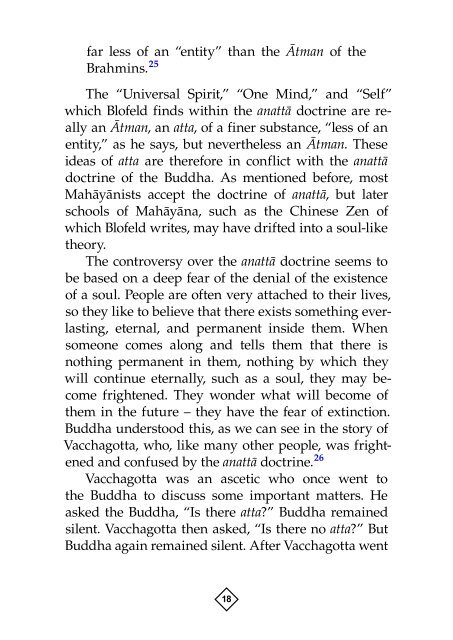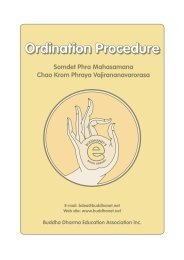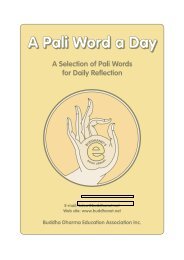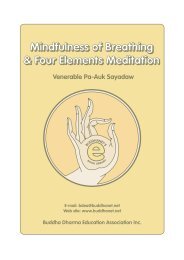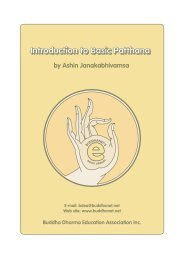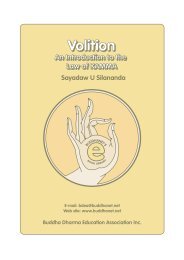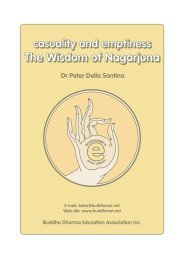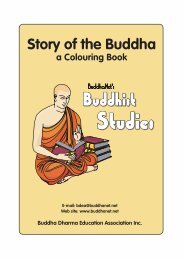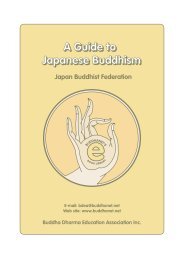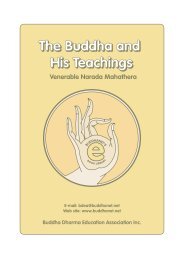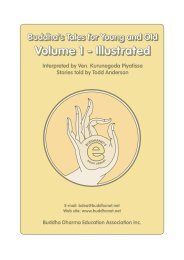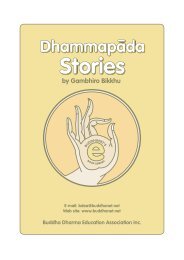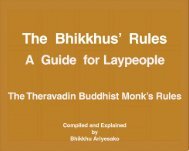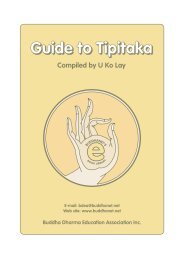No Inner Core: An Introduction to the Doctrine of Anatta - BuddhaNet
No Inner Core: An Introduction to the Doctrine of Anatta - BuddhaNet
No Inner Core: An Introduction to the Doctrine of Anatta - BuddhaNet
You also want an ePaper? Increase the reach of your titles
YUMPU automatically turns print PDFs into web optimized ePapers that Google loves.
far less <strong>of</strong> an “entity” than <strong>the</strong> âtman <strong>of</strong> <strong>the</strong><br />
Brahmins. 25<br />
The “Universal Spirit,” “One Mind,” and “Self”<br />
which Bl<strong>of</strong>eld finds within <strong>the</strong> anattà doctrine are really<br />
an âtman, an atta, <strong>of</strong> a finer substance, “less <strong>of</strong> an<br />
entity,” as he says, but never<strong>the</strong>less an âtman. These<br />
ideas <strong>of</strong> atta are <strong>the</strong>refore in conflict with <strong>the</strong> anattà<br />
doctrine <strong>of</strong> <strong>the</strong> Buddha. As mentioned before, most<br />
Mahàyànists accept <strong>the</strong> doctrine <strong>of</strong> anattà, but later<br />
schools <strong>of</strong> Mahàyàna, such as <strong>the</strong> Chinese Zen <strong>of</strong><br />
which Bl<strong>of</strong>eld writes, may have drifted in<strong>to</strong> a soul-like<br />
<strong>the</strong>ory.<br />
The controversy over <strong>the</strong> anattà doctrine seems <strong>to</strong><br />
be based on a deep fear <strong>of</strong> <strong>the</strong> denial <strong>of</strong> <strong>the</strong> existence<br />
<strong>of</strong> a soul. People are <strong>of</strong>ten very attached <strong>to</strong> <strong>the</strong>ir lives,<br />
so <strong>the</strong>y like <strong>to</strong> believe that <strong>the</strong>re exists something everlasting,<br />
eternal, and permanent inside <strong>the</strong>m. When<br />
someone comes along and tells <strong>the</strong>m that <strong>the</strong>re is<br />
nothing permanent in <strong>the</strong>m, nothing by which <strong>the</strong>y<br />
will continue eternally, such as a soul, <strong>the</strong>y may become<br />
frightened. They wonder what will become <strong>of</strong><br />
<strong>the</strong>m in <strong>the</strong> future – <strong>the</strong>y have <strong>the</strong> fear <strong>of</strong> extinction.<br />
Buddha unders<strong>to</strong>od this, as we can see in <strong>the</strong> s<strong>to</strong>ry <strong>of</strong><br />
Vacchagotta, who, like many o<strong>the</strong>r people, was frightened<br />
and confused by <strong>the</strong> anattà doctrine. 26<br />
Vacchagotta was an ascetic who once went <strong>to</strong><br />
<strong>the</strong> Buddha <strong>to</strong> discuss some important matters. He<br />
asked <strong>the</strong> Buddha, “Is <strong>the</strong>re atta?” Buddha remained<br />
silent. Vacchagotta <strong>the</strong>n asked, “Is <strong>the</strong>re no atta?” But<br />
Buddha again remained silent. After Vacchagotta went<br />
18


